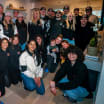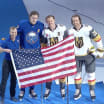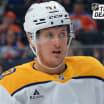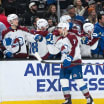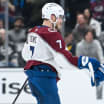Miracle on Ice impact inspired generations of American players
Forty years later, 1980 Olympic win remains defining moment in United States hockey history
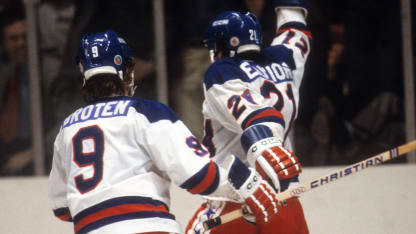
Even American hockey players who were born more than a decade later understand the significance of the United States' 4-3 win against the heavily favored Soviet Union on Feb. 22, 1980 and its 4-2 victory against Finland two days later that clinched the gold. Reaching beyond the politics of the era, including the hostage crisis in Iran and the Cold War with the Soviet Union, the Miracle on Ice inspired a nation in its immediate aftermath and a Hollywood movie and generations of players and fans in the years that followed.
To commemorate the anniversary, NHL.com spoke with some of those who lived it, witnessed it from afar or learned about its lasting impact.
How did the Miracle on Ice impact you personally?
Brian Leetch, 1988, 1998, 2002 U.S. Olympian
"At the time, it was just as important to me to be in a hotel room with my youth hockey team all watching it on TV. That was fun as a 12-year-old and an 11-year-old for us to be together and jumping up and down on the beds when the U.S. scored, so that was more in the moment. I would say within the next two, three, four years as you go through your upper levels of schooling and you learn a little bit more about the world around you and politics and everything that goes on and what that team went through, it became more and more important. And as my career went along and the Olympics actually became a reality on my radar, it all really became a big deal and every one of those players became a big deal.
"Any time (1980 Olympians) Mike Eruzione or Kenny Morrow or somebody was in the area they would stop by and say hi to the teams, whether we were on the junior national team or when we were training for the Olympics, it was always a big deal."
Tony Granato, 1988 U.S. Olympian, coach of 2018 Olympic team
"The most influential hockey moment ever for me was when that happened. I was 15 and that was the first exposure I had to even knowing that hockey was an Olympic sport. I didn't know it from '76. I didn't know it from '72. I just didn't hear of it, and then all of a sudden hockey is on the front page of the paper and in the spotlight on TV, and it's American kids. At that point, being a youth hockey player in Chicago, our chances of ever playing professionally were very, very slim. It was a Canadian-dominated sport and that opened the door for all of us. It gave us 20 overnight idols to look at and be our heroes. That's what it meant to me and it always will."
Max Pacioretty, Vegas Golden Knights forward, 2014 U.S. Olympian (born in 1988)
"It definitely helped grow the game and it's probably the reason why I'm playing now even though I wasn't alive at the time. I think it helped build the game to a point where a lot more kids were playing. That's probably a reason a couple of kids in my town (New Canaan, Connecticut) were playing before me, and then the reason why I picked it up as well."
Mike Modano, 1998, 2002, 2006 U.S. Olympian
"It had a great deal of influence on us as kids. We were all [nine] years old. We didn't really know the impact it had initially. We knew something magical was happening there, the whole thing, besides the Cold War that was going on and everything with the hostages in Iran. Politically, the two countries were just at each other and this whole thing kind of climaxed the relationship between the two nations. But it wasn't until later that we got into the world juniors and we had a distaste for every international team we played. But every national team or junior team or the Olympics or the World Cup, I think there was always a comment or something that referred back to 1980 and how long it's been since we had some success in international play."
Bill Guerin, Minnesota Wild GM, 1998, 2002, 2006 U.S. Olympian
"That's one of the things that impacted me the most. It had a massive impact on my love for hockey and my desire to be a hockey player. Just that win, that team, those people had a massive impact on my life. … I was only 9, I already loved the game, but then it took a whole other route. My passion for the game just grew. It such a huge win."
Chris Kreider, New York Rangers forward (born in 1991)
"As an American-born hockey player you grew up watching that movie (Miracle) like religiously, so yeah, I think that's something that resonates and something that inspired me. It has been unbelievable for U.S. hockey in general, and I have been lucky enough to represent my country and in international play. I think that kind of kicked off a pretty good push and, I think, USA Hockey has taken some enormous strides, and obviously that's a huge part of it."
Zach Parise, Wild forward, 2010, 2014 U.S. Olympian (born in 1984)
"That's the pinnacle of being a part of USA Hockey. It's the best U.S. team ever. To win the Olympics, as a U.S. kid growing up, that's what you look at. You look at the Miracle on Ice team, you know the names on the team, and you want to be a part of something like that."
Brian Gionta, 2006, 2018 U.S. Olympian, (1 year old in 1980)
"I think it was something that, I don't want to say when you start at USA Hockey, but in that range, that was what they drew on. It might have been 12 years after that time, but it was such a big story that that's kind of what we were brought in with, my generation, like (Scott Gomez) and me. It was the 1980 team, the Miracle team, so everything was kind of based around that. It was the basis for everything USA Hockey had for us. That was the most successful they'd been and everything was related to that, so at world juniors or USA Hockey camps, it was always about the Olympic team."
Craig Patrick, assistant GM and assistant to coach Herb Brooks on 1980 Olympic team
"We were just trying to win a hockey game, a hockey tournament. It's been so awesome. The road that's been traveled, it's been amazing. It warms my heart to know we accomplished something that's still remembered highly today."
Mike Eruzione, captain of 1980 Olympic team, scored winning goal vs. Soviet Union
"A lot of guys went on to the National Hockey League and had some really good careers and they've moved on with their lives. For me, I had an opportunity to do some broadcasting, still to this day do a lot of motivational speaking. I was proud to be at Boston University for 20-some-odd-years in the athletic department in the development office. I had the opportunity to meet presidents, play in celebrity golf tournaments, meet some of the best athletes in the world, go to some of the greatest places you can imagine, so, yeah, clearly 1980 has given me an opportunity to do things I wouldn't have imagined I would have been able to do."
Mike Eruzione breaks down Miracle on Ice Goal
What is the legacy of what the 1980 U.S. Olympic team did?
Jack Eichel, Buffalo Sabres forward (born in 1996)
"It's so remarkable what they were able to accomplish and do and, for me, it's pretty cool. Through some connections in Boston University I'm able to get to know a few guys on that team. I played golf with (1980 goalie) Jim Craig, and I see Mike Eruzione a pretty fair amount from being around Boston University and the campus. He's always around, so just getting to know those two guys. You look at their team, what they accomplished, it's so remarkable and so important for our game and especially for our nation."
Craig Patrick
"That's hard for me to answer, but I guess if you look at today's NHL rosters, there's a whole lot of American hockey players, U.S. hockey players on all the rosters. I know when I entered the League, there were four U.S. players in the League. That was early '70s, so it's grown leaps and bounds from the early '70s until now. I'm sure if you talked to some of the generations after '80, they'll look at that and say that was certainly an inspiring moment in their lives to dedicate themselves to hockey."
Max Pacioretty
"What's really cool is now I can watch the movie (Miracle) with my kids, and I can teach them about, you know, the 1980 Olympics. What's really cool is I always played a tournament in Lake Placid growing up, so I knew all about it. I met Eruzione a couple times, we actually saw him the other day when we were in Boston. You know, just through learning about it, all the players on the team mean a lot to USA hockey."
Seth Jones, Columbus Blue Jackets defenseman (born in 1994)
"It's one of the most iconic moments in USA hockey history, of course. For kids that, obviously like myself, weren't alive at that time, to go back and see what actually happened. ... Even to this day, I've probably seen it about 20 times ... when the clock's counting down from 5-4-3 and the buzzer goes off, I still get the chills. I can only imagine what it was like being in Lake Placid at that time and being there live."
Brian Boucher, retired NHL goalie, NBC Sports analyst
"I was 3 years old when the miracle happened, so I don't pretend to remember it live, I certainly do not. But the stories and the generation before me, guys who might have been born in '72, '73, guys in that era, I think they were inspired big-time by the Miracle on Ice. If you think about guys who were on that '96 World Cup team in the U.S., those birth years, guys like (Keith) Tkachuk, (John) LeClair, (Tony) Amonte, (Jeremy) Roenick, they were my idols in USA Hockey. They were inspired by the 1980 Miracle on Ice, so even though I didn't have a direct connection to the '80 Miracle on Ice, the fact that they inspired the guys ahead of me, which they were inspired by the '80 team, I think that's the trickle-down effect that you have."
Connor Hellebuyck, Winnipeg Jets goalie
"I think it's the base (that) makes U.S. hockey great. The goaltending, Jim Craig, was phenomenal. It's always one of those performances you can look up to no matter how old the game is. You always look back to that moment."
Buzz Schneider, 1980 U.S. Olympian
"I can't believe after 40 years that we are still resonating with all the excitement and everything that goes along with what we did in 1980. We just wanted to play hockey and that is what we did. We never realized the impact of what we did when we did it."
Al Michaels, play-by-play announcer for ABC in 1980
"This brought the country together in a way that I've never seen. This was such a great event and such a happy event and such a thrilling event. And for it to happen in the sport of hockey, which was Canada's sport, and it pretty much becomes the Soviet Union's sport, and down the pecking order in the United States. But this hockey game was able to galvanize the country."
Mike Eruzione
"I still travel around the country, I do a lot of corporate outings, a lot of speaking, playing a lot of golf tournaments, meet a ton of people and everybody's got a story to tell. I've had people come up to me and literally start crying because that moment meant something to them. Whether it was the last time they watched the game with their mother or father, or their grandfather or grandmother, or as a family. I've had soldiers, Vietnam veterans, come up to me and talk about how they just thought their whole lives were ruined after they came back from Vietnam and there is no faith in the country. All of a sudden we come along and renewed that faith and that belief in the United States. I've had people tell me it was an unbelievable hockey game, so the gamut of stories run from it meant something to them personally, emotionally, it meant something to them politically, or it meant something to them as a hockey game."
